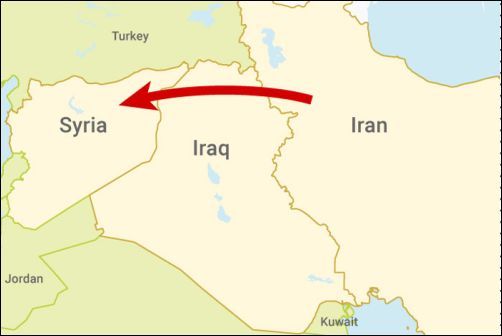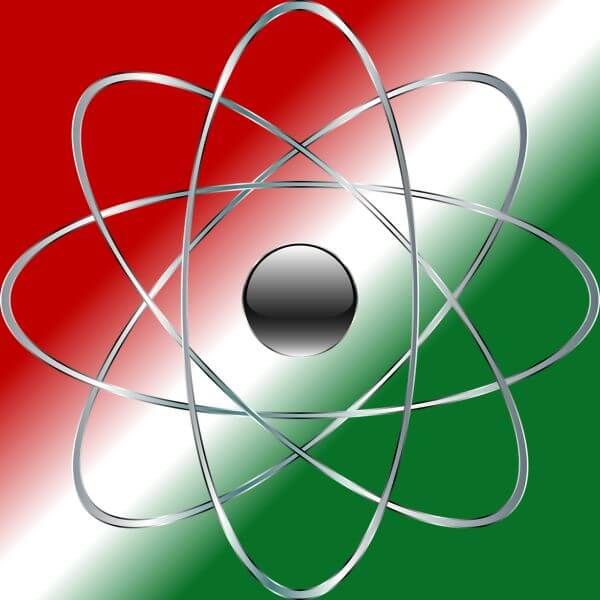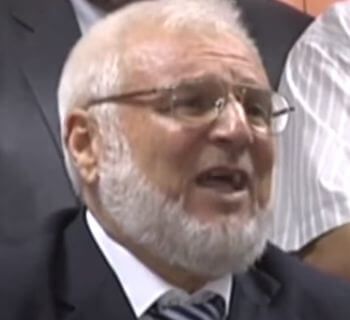Today’s Top Stories
1. The fallout from the White House’s decision to pull American troops out of Syria continues. The New York Times cited unidentified Israeli intelligence officials saying they felt “betrayed by the US,” while Prime Minister Benjamin Netanyahu said the IDF may expand its activities in Syria if necessary. The withdrawal puts pro-Israel groups in a bind.
Analysts told AFP the pullout is a strategic victory for Iran, allowing Tehran consolidate its “land-bridge” to the Mediterranean. See commentary below assessing what it all means for Israel.

2. The US Agency for International Development (USAID), which administers civilian foreign aid and developmental assistance, notified Palestinian grant recipients that funding may come to an end on January 31. It’s “due to a new U.S. anti-terrorism law that could compel the Palestinian Authority to compensate American victims of terror attacks in exchange for U.S. assistance.” National Public Radio explains:
A U.S. official said the USAID funding cut was not final, and aid money could continue if Congress passes an amendment to the Anti-Terrorism Clarification Act after the government shutdown. A Senate aide said there was bipartisan interest in Congress to find a fix to allow funding to continue. The officials spoke on condition of anonymity because they were unauthorized to brief the media on the matter.
The anti-terrorism law could also put an end to U.S. funding to Palestinian Authority security forces, which coordinate with Israel to maintain security in the West Bank. An official in Palestinian Authority President Mahmoud Abbas’ office told NPR he believed the U.S. would find a way not to cut security funds.
3. British taxpayers are still funding ‘lessons in hate’ at Palestinian schools where children are made to stage mock executions and read poetry glorifying terror.
The school books, which were introduced in September 2017, teach ten-year-olds that ‘drinking the cup of bitterness with glory is much sweeter than a pleasant long life accompanied by humiliation’.
Terrorists – including Dalal Mughrabi, who led the 1978 ‘Coastal Road Massacre’ in which 38 Israelis including 13 children were murdered on a bus – are described as ‘heroes’.
The books also contain violent poems which extol the virtues of ‘sacrificing blood’.
Join the fight for Israel’s fair coverage in the news
In the News
• According to Albanian media reports picked up by the Times of Israel, Prime Minister Netanyahu’s cancellation of a November visit may have been because of an Iranian plot targeting him and/or Israel’s national soccer team, and and/or Tirana’s refusal to expel Iranian diplomats despite US pressure. On Thursday, Albania expelled Iran’s ambassador and another diplomat for “violating their diplomatic status.”
 • Iran’s nuclear archive stolen by Israel confirms how a uranium mine and yellowcake production plant in the southern Iranian district of Gchine were originally part of a clandestine nuclear weapons fuel cycle. Yet, the mill never stopped operating and the files directly contradict Tehran’s declarations to the International Atomic Energy Agency, according to a report. The authors explain why it all matters:
• Iran’s nuclear archive stolen by Israel confirms how a uranium mine and yellowcake production plant in the southern Iranian district of Gchine were originally part of a clandestine nuclear weapons fuel cycle. Yet, the mill never stopped operating and the files directly contradict Tehran’s declarations to the International Atomic Energy Agency, according to a report. The authors explain why it all matters:
A sobering fact is that the issue of Iran’s past and possibly on-going nuclear weapons work is still unresolved. Some try to discount this issue by adopting the stance that everything is known anyway, or that the worst should be assumed and move forward, but the Nuclear Archive makes readily apparent that much remains unknown. In particular, this information matters with regard to any past nuclear weapons effort continuing today.
In the end, the reason to insist on Iran fully declaring its nuclear programs concerns the health of, and compliance of Iran with provisions of the Nuclear Non-Proliferation Treaty, its comprehensive safeguards agreement, the Additional Protocol, and the JCPOA. This issue festers and raises fundamental questions about the value of these agreements to stop nuclear proliferation and the ability of the IAEA to conduct credible verification.
In addition, the JCPOA is not a permanent agreement. Its provisions will end, leaving Iran well-placed to resume building up its nuclear breakout capability, with an apparently ready military nuclear effort to draw on from the archive it maintains. It could also trade this information to other states or groups, as it has done with missile technology.

• AFP sums up the real reason Mahmoud Abbas is keen to dissolve the Palestinian Legislative Council, even though it hasn’t met in more than a decade:
Though the parliament has not met since 2007, when Hamas seized control of the Gaza Strip, Palestinian law allows for its speaker to act as interim president should 83-year-old Abbas die in office.
Thus, Aziz Dweik, a Hamas member from Hebron, is technically first in line to succeed Abbas.
• Donorbox, a US firm which makes fundraising management software, confirmed that it blocked the account of the Ramallah-based Boycott Divestment and Sanctions campaign against Israel. More at AP.
• Nice scoop for CNN, being the first news service to get an exclusive first-hand look at one of the Hezbollah terror tunnels uncovered by the IDF.
• Drip drip drip: UK Labour MP Ivan Lewis quit the party over antisemitism, saying “I could no longer reconcile my Jewish identity and current Labour politics.” Lewis will continue to represent his Manchester-area constituency as an independent MP.
• Antisemitism allegations are splitting the Women’s March.
• When BDS comes to campus, antisemitism follows.
• Israeli anti-drone technology brought an end to three days of chaos at London’s Gatwick Airport. Everybody picked up on the Daily Mail‘s scoop. British authorities said two people arrested on Friday night are no longer suspects and were released without charge.
• Around the world: Belgian soccer fans sing chant about burning Jews. French imam indicted over antisemitic sermon. Australian school principal poses with children in blackface, Hitler costume. Paris duty free shop apologizes for invoice calling Tel Aviv airport “occupied Palestine.”
Commentary
• Plenty more spilled ink and burnt pixels weighing in on the US pull-out.
– Raphael Ahren: Trump pullout from Syria leaves Israel alone to battle Iran’s likely resurgence
– Shimon Shiffer: US leaves Israel to fight its battles alone
– Tony Badran: Trump reversal on Syria policy means big gains for Iran
– Amos Harel: Israel left with false Russian promises and volatile US president
– Zvi Bar’el: US exit from Syria could redraw the map of the Middle East’s blocs
Last but not least, Amos Yadlin‘s Twitter thread urges everyone to take a deep a breath and count to 10.
Trump’s declaration on US forces withdrawal from Syria is a significant step, but there’s no reason to panic.
2000 US troops came to Syria to fight against ISIS and had no authorities to act against Iran.
1/8— Amos Yadlin (@YadlinAmos) December 20, 2018
• Here’s other commentary I’m reading this weekend:
– Jerusalem Post (staff-ed): Why didn’t the IDF’s media blitz lead to UN condemnation of Hezbollah?
– Herb Keinon: Why did Israel got to the UN over Hezbollah tunnels?
– Peter Lerner: The need for a civilian maestro to command the media and diplomatic efforts
– Khaled Abu Toameh: Palestinian children: Victims of Arab apartheid
– Avi Bell: Is “East Jerusalem” Palestinian territory?
– Stuart Eizenstat: US companies need relief from BDS pressure
– David Bernstein: Everyone is misreporting the Texas BDS lawsuit
Featured image: CC BY Christine Rondeau;; atom CC0 Pixabay; Dweik via YouTube/HispanTV;
For more, see yesterday’s Israel Daily News Stream and join the IDNS on Facebook.
Before you comment on this article, please note our Comments Policy. Any comments deemed to be in breach of the policy will be removed at the editor’s discretion.



